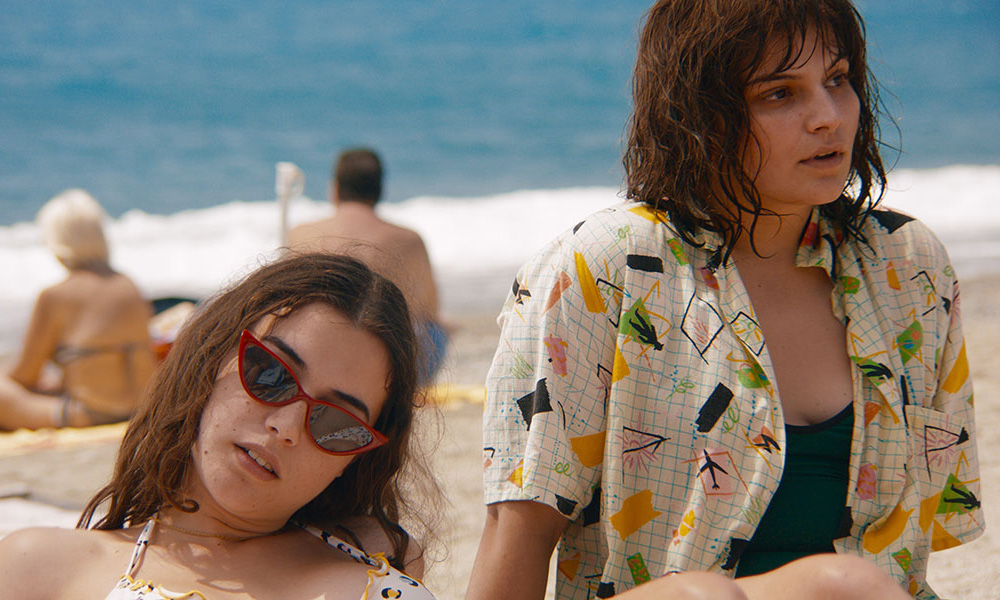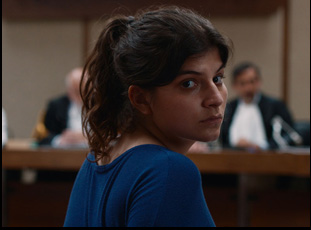“You realize you’re free to do whatever you want, right?” Giada (Giorgia Frank) tells her best friend Veronica (Margherita Cornali) in “Holiday,” far from the beachside resort town where the two grew up at a quiet cove unknown by the tourists and even most locals. Even before she went to prison, you sense that Veronica felt confined, shy, withdrawn and no doubt consigned to a life working in her parents’ hotel where if it weren’t for Giada, the daughter of one of its housekeepers, she’d be entirely alone in her thoughts. At 19, she is introduced in Edoardo Gabbriellini’s compelling drama only starting to contemplate what her future outside might be like if she didn’t stand trial for murder, either caught in the wrong place at the wrong time when her mother and her lover were found dead in the pool of the villa or showing her devotion to her father in the most unseemly way.
In his third feature as a director, Gabbriellini is less interested in the whodunit aspect of the murder mystery than who Veronica is, having no opportunity to discover herself apart from her parents and a cloistered life helping out at the hotel before being trapped once again by the scandal that ensues upon her trial, engulfed by media outlets always sitting outside her home even after she’s acquitted. She is shown with nowhere to run, not only in terms of escaping Liguria where she can only sneak out for short excursions with Giada without attracting unwanted attention, but also time when Gabbriellini and co-writer Carlo Salsa — as well as editor Walter Fasano, a frequent collaborator of Luca Guadagnino, who is a producer himself here — craft an intricate structure for the film where her past locks her into a mindset she can’t easily shake, still beholden to her mother’s unkind assessment of her capabilities and unsure whether beyond Giada if the people wanting to engage with her now are only interested due to her newfound notoriety.
As Veronica seeks her own personal truth, “Holiday” raises plenty of provocative questions amongst its audience regarding moral boundaries and the age at which adolescents begin being treated as adults and when the film finds its lead all alone in a courtroom with her fate batted about by a bunch of men who won’t likely appear in her life again, Gabbriellini creates a compelling consideration of agency when telling of someone who is never afforded control over her own life. Shortly after the film’s premiere at the Toronto Film Festival, the director spoke with the help of a translator about what led him to wanting to tell such a story, how he was able to discover unknown talent as he once was when he was first cast as an actor in Paulo Virzi’s 1997 coming-of-age comedy “Hardboiled Egg,” and the occasional benefits of leaving things up to chance.
The starting point was a photo of a young girl in a prison courtyard in a newspaper, and I saw in that picture in her eyes that she was ready to start her youth, but that something interrupted that growth. I don’t know what his crime was, or if she was innocent or guilty, but because of her youth, I felt she had to be innocence. From there, I started asking questions that opened up the whole film because the film is about questions not answers.
At the beginning, I wanted to [tell] a linear story, but after a very short time with my colleagues and co-writers, I felt something missing, so I decided to try to look at that day [of the incident], because the part in the past is only one day from the morning to the night, and then as [you see the] two kids playing, we understand that we miss [something only watching] the trial. Plot is important for me, but what’s most important is staying very close to the character.
How did you find this wonderful actress that you’ve got as Veronica?
In the middle of the street. I made a long street casting in that village in front of the sea in Liguria and at a certain point I saw [Margherita], beautiful and perfect for my character. She studied in Bologna and she didn’t want to come [to the initial casting]. “It’s too good to be true,” [she said] “because I don’t know you. What do you want from me? Maybe you are a pervert. [laughs] But at the end I saw on her Instagram and I asked her, “Please bring your friends to the audition” and I found [the actress who plays] Giada because they are friends from high school. And they gave me a lot of gifts. They’ve known each other since high school, so I used their interaction in the movie. Their cigarette [smoking] wasn’t in the script and [I saw] the way they used to pass their cigarettes onto each other in the morning and [put it in the film].
And I have the same story as Margherita, because I started as an actor for this director Paolo Virzi, who found me on the beach. And the few times that I was an actor, I did it with instinct and not with technique because I didn’t go to school [for it], so I try to steal something from the real personality of the [actors] in front of me. I also wanted something unconsciousness for Veronica. I needed someone who wasn’t aware of what she was doing, like the character didn’t know what was happening to her, so she herself was surprised every time something happened to her. I thought I could get that from [Margherita].
Could you build the schedule in a way that it could help her build the character?
Unfortunately, it’s impossible in Italy. I shot the movie in four weeks. We’d only have this location for today because the owner tomorrow leaves or that actor is not available next week, and for the trial, we had this real court in the city. but we only had the permission [to film] for three days, so of course, you have an artistic and a creative idea, but you you need to try to find a solution. Can I tell you a little secret? In the club scene, we had only 30 extras, and during the shooting, [we’d shoot from one side] and say, ”Ok, ta-ta-ta, and you move on the other side” because now the camera arrives [over there].” When you don’t have money, that’s where the creativity is.
Did you actually write with locations in mind?
Yes, but only in my mind because I never I never been in that part of Italy in my life and I spoke a lot with Luca [Guadagnino] about the story as a producer and we [were thinking about filming] near Venice, but I felt that in that part of Italy there is too much melancholy and [Luca] agreed and that we needed more joyful color [from the] past, so [we were led to] exactly of the opposite part of Italy and when I started to write the story, I had exactly that kind of hotel in my mind, and it’s the first one I saw when I just arrived in Liguria. So even if you have a vision, you find something and you feel that it is destiny.
The film has a fascinating visual style, particularly once you enter the court. What was it like to figure out how to tell this story visually?
I wanted to make the [trial] claustrophobic and to make [Veronica] feel inadequate. Her place was not there [in the courtroom], so I wanted to feel a pressure [whereas] when they are outside, I told the story of the summer, which for me is the season of teenagers with the sun and the sea as a counterpoint to the horror that [she] was living [throughout the trial]. And when you are a teenager, you still feel inadequate because you are no longer a child but not yet an adult. You’re an adolescent and a lots of times, I thought about [the visual style] of those beautiful French movies from the 1980s.
There was one especially interesting shot at the edge of a hill where you see Veronica and Giada walking up and it pivots to film them looking out onto the coastline. Was it tricky to get?
For me, that was very important because that’s a metaphor for her life. She’s always on the edge, and when they’re going up [the mountain] in the car, the trajectory of the road also represents that period and her specific situation.
You’ve reached a summit as well with this film. What’s it like getting to this point of starting to getting it out into the world?
For me it’s wonderful. We just finished the post-production, and the invitation from Toronto was a beautiful sign, and the film will also go to the festival in Rome, but the idea that the first audience was so far from my home was a beautiful gift because it meant that the film could be appreciated by people very far away from where it was filmed. My hope is that in the end, you will love Veronica, even [with] everything that’s happened to her, and when people can understand, [being a] director is the most beautiful thing you can be.
“Holiday” does not yet have U.S. distribution. It will next play at the Rome Film Festival.





